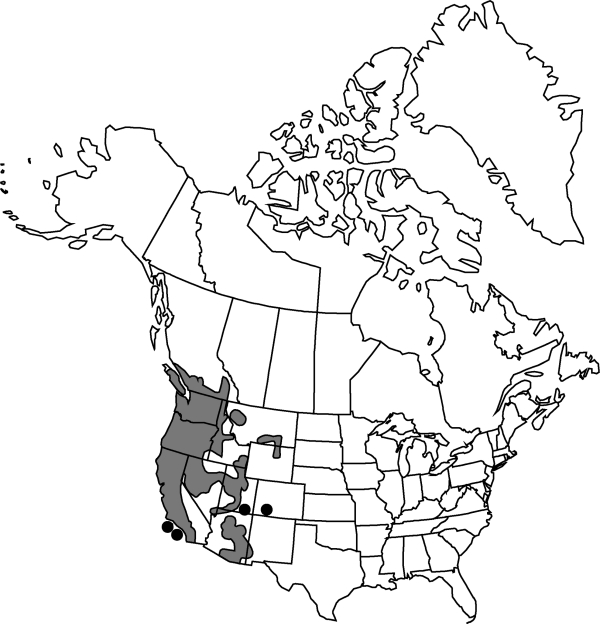Claytonia perfoliata
Sp. Pl. 2: 1186. 1798.
Plants annual, with minute, tuberous bodies; periderm absent. Stems 5–50 cm. Leaves: basal leaves in suberect to erect, seldom flattened rosettes, petiolate, 1–30 cm, blade often with weak red pigmentation, broadly rhombic to deltate or reniform, 1–7 × 0.5–5(–6) cm, apex obtuse to apiculate, mucro 1–3 mm; cauline leaves sessile, blade perfoliate or cleft or notched, 10 cm diam. or less. Inflorescences 1-bracteate; bract leaflike, 0.5–15 mm. Flowers 3–10 mm; sepals 1.5–4 mm; petals pink or white, 2–5 mm; ovules 3. Seeds 2–5 mm, shiny and smooth; elaiosome 1–3 mm. 2n = 12, 24, 36, 48, 60.
Distribution

w North America (including Mexico), Central America (Guatemala), adventive in Europe, Pacific Islands (New Zealand).
Discussion
Subspecies 3 (3 in the flora).
Selected References
None.
Lower Taxa
Key
| 1 | Basal leaf rosettes erect, 20-50 cm; cauline leaf pairs connate into perfoliate discs, blade margins entire; seeds 3-5 mm | Claytonia perfoliata subsp. perfoliata |
| 1 | Basal leaf rosettes suberect to flattened, 2-30 cm; cauline leaf pairs perfoliate, blade margins notched or deeply cleft; seeds 2-4 mm | > 2 |
| 2 | Basal leaf blades ovate to broadly rhombic, apex obtuse; leaf blades often beet red, gray-green, or purplish; epidermal gas pockets easily seen in field; seeds 3-4 mm | Claytonia perfoliata subsp. intermontana |
| 2 | Basal leaf blades deltate, apex apiculate; leaf blades mostly green; not beet red; epidermal gas pockets usually not visible (except in populations of California Transverse Ranges); seeds 2-3 mm | Claytonia perfoliata subsp. mexicana |